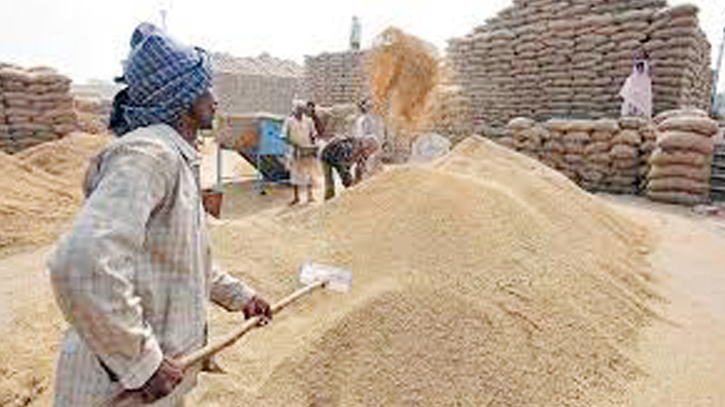
Photo: Messenger
Despite a bumper yield of Boro paddy across the country, farmers are not smiling as they are not receiving fair prices. Currently, paddy is selling at Tk 850-930 per maund in the market, while the production cost per maund is about Tk 1250. Consequently, farmers are incurring a loss of Tk 350-400 per maund. Agricultural researchers have warned that if farmers lose interest in paddy cultivation, food security will be threatened.
According to related sources, favourable weather conditions have led to a good yield of paddy during this year's Boro season nationwide. Most of the paddy has now been harvested and stored in farmers' homes. However, farmers are distressed by the low market prices for their paddy.
Experts warn that farmers are losing confidence in paddy cultivation due to recurring annual losses. If this trend continues, the country's food security could be at risk. To safeguard agriculture, experts advise that the government must support farmers. This could include providing incentives to ensure fair prices for paddy.
Investigations reveal that the paddy harvest in the Haor region of the country has already been completed. In other areas, including Chalanbil, more than half of the paddy has been harvested. However, when farmers attempt to sell their paddy in the market, their smiles fade as they face disappointingly low prices.
At present, coarse paddy is being sold in the market for Tk 800 to 850 per maund depending on the quality. And BR 29 variety of fine paddy is being sold at Tk 900 to 930. But the farmer has spent at least Tk 1200 to 1250 on the production of one maund of paddy. In that case, the farmer's loss is currently Tk 350 to Tk 400 per maund.
Talking to the farmers of different areas of the country, it is known that they are disappointed because of not getting the fair price of paddy in Boro season.
Badsha Mia, who came to sell paddy in Jhenaidah's Goalpara Bazar, said that coarse paddy has to be sold at Tk 800 to Tk 820 per maund. However, the production cost per maund is Tk 1150 to 1200. "Now, I have to sell at a loss of around Tk 400," he regretfully stated. He added, "If I continue to incur losses every year, I will consider cultivating something else instead of paddy in the future."
Agricultural economists argue that if farmers incur losses every year by producing paddy, there is little incentive for them to continue doing so to provide food for the country's 17 crore people. If farmers become frustrated and abandon paddy cultivation, it will disrupt food production and lead to a food crisis.
In this regard, Professor Abdus Sattar Mandal, former Vice Chancellor of Bangladesh Agricultural University, told The Daily Messenger that the government buys only 3 percent of the paddy produced. The remaining 97 percent is purchased by private rice mill owners and traders. This year, the government set the price of paddy at Tk 1,280 per maund during the Boro season, but this has not been reflected in the market. The price of paddy produced by farmers largely depends on the profit margins of traders and mill owners.
He also noted that when paddy is stored in farmers' homes, its market price is low. However, when rice is stocked in traders' warehouses, the price of the product increases drastically. Mill owners, traders, and middlemen benefit from this situation, while farmers bear the losses.
According to sources, the contribution of agriculture sector to the GDP of Bangladesh is 14.23 percent. About 40 percent of the country's total labour force is still engaged in agriculture.
According to a report of the Food and Agriculture Organisation of the United Nations, the position of Bangladesh in the growth of rice production is currently at the top. Farmers, government, agricultural researchers, and agricultural institutions are all partners in the incredible success of agriculture in Bangladesh, yet the farmers are the most deprived of its benefits.
Jahangir Alam Khan, an agricultural economist and former member of the Bangladesh Agricultural Research Council, stated that farmers are currently disoriented due to the low market price of paddy. They are losing confidence in agriculture as they face annual losses. If farmers become disheartened and lose interest in paddy cultivation, food production will be disrupted and food security will be threatened. Therefore, to ensure food security, farmers must be paid a fair price for the paddy they produce.
It is important to note that the government has announced the direct purchase of paddy from farmers at Tk 1280 per maund to prevent the decline in the price of Boro paddy in the market. However, this declaration seems to be limited to paper only. The Food Ministry has not yet initiated the purchase of paddy in all areas. In some places, actual farmers are unable to sell their paddy, even if they manage to buy a small quantity. Complaints have been received regarding the complexity of the app, which prevents farmers from registering their names.
Consequently, government officials and local influential businessmen are reportedly profiting by selling paddy in the name of farmers.
Messenger/Disha








